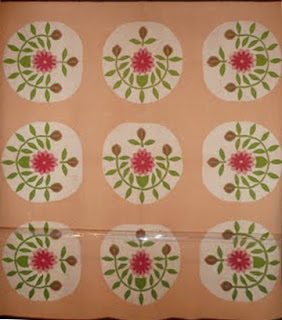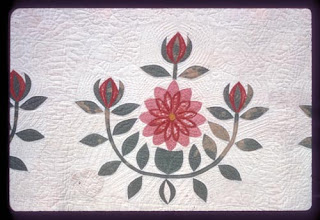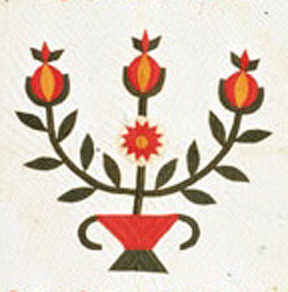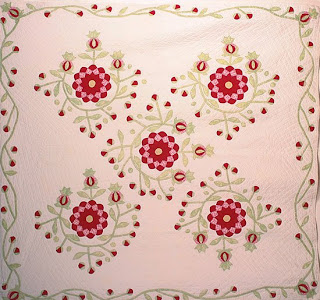Rose Tree, Missouri Rose or Prairie Flower,
mid-19th-century from an online auction
Once Bets Ramsey and Merikay Waldvogel realized in the Quilts of Tennessee project that some of the rose quilts we assumed to be appliqued were actually pieced they began looking closely for seams. Surprisingly, they found that a few of these quilts we might call Rose Tree are pieced.
This detail shows how the pattern can be pieced into a circle.
Here's a quilt now in Texas (in the collection of the American/International Quilt Association)
that shows how the circles were then pieced into the background.
Two details from the Tennessee project.
I've seen perhaps a dozen pieced rose trees over the years. My digital picture file contains quilts primarily from Tennessee and Texas. The Quilt Index files from the Quilts of Tennessee project are a good source as are the files from the Briscoe Center for American History, University of Texas at Austin: Winedale Quilt Collection.
Few of the variations are all pieced, some are all applique and some are a combination. Some come with a pot or a tree trunk.
There are often nine blocks as in this one from an online auction. It has a nice balance with a pieced (?) rose in the center.
From the photos it looks like some of it is pieced, some applique. See the seams in the center of the rose here and the way the top of the tree trunk has a curved seam.
These floral trees are numbered 44 in my Encyclopedia of Applique. The names published in the 20th century include
Conventional Tulip - Marguerite Ickis
Rose and Buds - Nancy Cabot
Prairie Flower - Carlie Sexton
Missouri Rose - Hall and Kretsinger
Rose Tree - Kretsinger
This pattern typifies the problems with 20th-century published names. We can't assume they were used in the 19th century by the women who made the quilts.
Jane Shelby, 1855
Mississippi Beauty
The Texas Sesquicentennial Quilt Association's Texas Quilt Search found an appliqued variation inscribed with these words:
"Mississippi Beauty
Judith Connor's Quilt
Persented [sic] by Jane Shelby
Feb. 10, 1855"
See more of the Mississippi Beauty at the Quilt Index:
http://www.quiltindex.org/fulldisplay.php?kid=4F-88-CA
Two others:
http://www.quiltindex.org/fulldisplay.php?kid=4C-83-C21
http://www.quiltindex.org/fulldisplay.php?kid=4F-88-9A
Detail of a Texas quilt by Susan Bell Miller at the Briscoe Center
Rose Kretsinger's New Rose Tree from the Spencer Museum, about 1930. This one is all appliqued.
http://collection.spencerart.ku.edu/eMuseumPlus?service=ExternalInterface&module=collection&objectId=11181&viewType=detailView
The International Quilt Study Center and Museum has a few in their collection:
Here's one dated 1892 (#2007.038.0011)
http://cdn.firespring.com/images/1ffcb1ad-2213-4569-ab47-f254a73622d3.jpg
Another dated example, 1857 by Eliza J. Herron (1997.007.0908)
http://cdn.firespring.com/images/397308df-f80f-42b3-9042-dbc5377dcb69.jpg
They also have one from the 1930s (1997.007.0820)
http://cdn.firespring.com/images/69d12cc6-abd1-4e90-b147-3b806fafe8a9.jpg
Rose Tree from an online auction.
The central roses and the buds could be pieced
but the leaves are probably all appliqued.
And blogger Barbara Chainey has pictures of one in Patricia Cox's collection.
http://barbarachaineyquilts.wordpress.com/2012/02/12/a-few-more-details/
See my post about the pieced roses here:
http://barbarabrackman.blogspot.com/2012/06/show-off-piecing-whig-rose.html













I am still so impressed with this idea. Have to find the time to try it out. It is exciting to think we could have the look of applique without the toil.
ReplyDeleteI cannot imagine piecing the appliqués, I would think it would be easier to appliqué them, lol.
ReplyDeleteDebbie
The first question that came to mind was ... WHY ... WHY would someone do such difficult piecing. "Showing off" seems to be the only answer. And it worked. Here we are, in another century, looking on with amazement.
ReplyDeleteBarbara, I have some close detail pictures of the quilt I showed on my blog, and somewhere I will have pictures of the full quilt. The quilt itself remains in the collection of Patricia Cox in Minnesota. Would be happy to send if you would like.
ReplyDeleteMy friend Jacqueline realized a similar quilt :PRAIRIE FLOWERS ,some years ago (1990 ?).She used piecing to do it.Our professor in PARIS was SOPHE CAMPBELL now returned to Michigan .The original quilt ,the inspiration ,is in METROPOLITAN MUSEUM ,NEW YORK ;it is pieced
ReplyDeleteThose two books on red and green quilts are in my favorites section. Both books are so well written and all the beautiful quilts...
ReplyDeletePieced applique is too confusing for me, I guess you can't teach an old quilter anything (me anyway)
Your blog is so wonderful and all the links are such fun to investigate. You are so generous with your knowledge and it is such a treat to see. I have almost all of your books, and I'm saving up for the Saints one. It looks like treasure